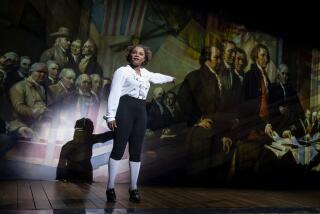Book review: ‘First Family’ by Joseph J. Ellis
- Share via
First Family
Abigail & John Adams
Joseph J. Ellis
Alfred A. Knopf: 304 pp., $27.95
John and Abigail Adams are the most well-known, most-written-about couple in America’s Revolutionary generation. Why? Because they left such a well-constructed paper trail. The exigencies of John’s careers as a revolutionary, diplomat and politician kept the pair apart for long stretches of their 54-year marriage. While that was not so good for them, it was a blessing for historians, as the often-great distance required them to communicate on paper.
Their epistolary record forms the basis for our understanding of their marriage and sheds great light upon their personalities. This is fairly well-explored territory. But as Joseph J. Ellis notes in his engaging “First Family: Abigail & John Adams,” “because the relationship between Abigail and John was so seamless, any biographer of one almost automatically ends up writing about both.” Unlike other biographers, whom Ellis says “lean in the direction of [writing about] the partner,” his goal in “First Family” is to write about “the partnership itself.” Detailing the history of this “long-standing conversation,” as Ellis terms it, tells us much about American history: “Recovering their experience as a couple quite literally forces a focus on the fusion of intimate psychological and emotional experience with the larger political narrative.”
And there is no question that John and Abigail were in a true partnership, not just in the sense of husband and wife, but in their sense of themselves as people whom history would pause to notice. That is why, unlike that other famous presidential couple, George and Martha Washington, Abigail and John preserved their correspondence, painstakingly copying as many of their missives as they could before they went out (these letters are collected in the newly reissued “My Dearest Friend,” for which Ellis wrote a foreword). They wrote as if future generations were looking over their shoulders. This was not mere vanity. They understood, as Ellis points out, that “they were living through a defining chapter of American history” and wanted to go “beyond their own family … and document their role in resolving the imperial crisis … for all of posterity.”
We see that impulse at work in John’s response to an altogether extraordinary series of letters written in 1804 between Abigail and the couple’s friend Thomas Jefferson. At one point, Abigail hurled a lightning bolt at the Virginian about his support of the venomous polemicist James Callender, who had gone into print with vicious attacks on John. Abigail called Jefferson out as having lied when he said he had not provided monetary support for Callender as he excoriated John, and she even referred obliquely to his relationship with Sally Hemings. Abigail’s weapon hit its target, deeply wounding the then-president, who never again felt the same about his former dear friend. Abigail had carried on this correspondence in secret, and John appended a note to the last letter, stating that the “whole of the correspondence” had been carried on without his “knowledge or suspicion.” He went on to say that he would make no comment on it “at this time and in this place.” To whom was he speaking but later generations, whom he fully expected to read the letters and make judgments about their authors and the roles they had played in the rough and tumble of politics?
“First Family” is written with the grace and style one expects from the author of the Pulitzer Prize-winning “Founding Brothers.” Although Ellis credits other historians who have written about the pair — Page Smith, John Ferling, David McCullough for John; Lynne Withey, Phyllis Lee Levin, Edith Gelles and Woody Holton for Abigail — this is a very “Ellis-centric” work. There is little evidence of exactly how these historians helped frame his view of the couple. Instead, Ellis’ presentation relies almost solely on the correspondence. One wishes that there had been a bit more engagement with others’ scholarly insights about the pair.
Ellis does succeed in his goal of creating a portrait of John and Abigail as a couple, although he tends to idealize their union, likening their marriage to “music they made together” that “stopped” once Abigail died in 1818. But he does not sufficiently answer the question of why a man who loved his wife so much was willing and able to leave her for years at a time. There was, of course, John’s sense of duty to the country he helped to invent. Still, others were able to be patriotic without spending so much time away from their wives. At one point, Ellis compares the Adams marriage to what is known about the marriage of Thomas and Martha Jefferson, and finds Thomas wanting because he would never be willing to have a wife as strong-willed as Abigail. Aside from the fact that Martha Jefferson was no shrinking violet, it is hard to imagine the very uxorious Thomas Jefferson choosing to stay away from his wife and loved ones for years at a time. It just would not happen.
On the other hand, Ellis is utterly realistic about the strengths and weakness of John Adams, and his observations about the second president — for example, referring to John’s “lifelong conversation with his internal demons” — are the best part of the book. Ellis, who wrote of Adams’ later years in “Passionate Sage,” knows his man well. When Adams says or does something stupid, Ellis says he was being stupid. When he acts out of vanity or pique, Ellis names the vice, writing with the confidence of one who is sure enough of his subject’s place in history that he has no need to provide a defense. In that sense, John Adams could not have a better biographer. “First Family” is an elegant addition to the steady stream of books about members of the founding generation.
Gordon-Reed is a 2010 MacArthur award recipient and the author of “The Hemingses of Monticello: An American Family,” (2008) which won the National Book Award and the Pulitzer Prize.
More to Read
The biggest entertainment stories
Get our big stories about Hollywood, film, television, music, arts, culture and more right in your inbox as soon as they publish.
You may occasionally receive promotional content from the Los Angeles Times.










